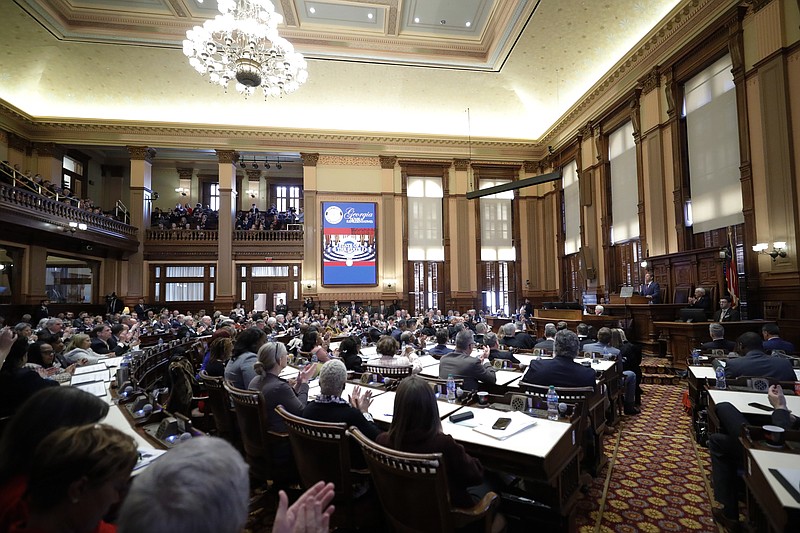ATLANTA (AP) — House budget writers in Georgia want to shift $100 million into the state employee health plan to reduce the sting of health insurance premium increases for public school districts.
The House Appropriations Committee on Wednesday included that change as it voted to approve House Bill 18. It amends the state's budget, which ends June 30. House members are likely to vote on the amended budget Thursday, which includes $2.4 billion in additional spending after Gov. Brian Kemp bumped up projected revenue.
The Republican governor's $1 billion plan to give property tax rebates to homeowners would cost $100 million less than Kemp previously estimated, said House Appropriations Committee Chairman Matt Hatchett. The committee wants to shift that $100 million to stretch out to three years a 67% increase in health insurance premiums that districts would have to pay for nonteachers, instead of requiring districts to pay the entire $457 million in one year.
House members rejected Kemp's plan to provide $25 million in grants to school systems to help children make up for missed learning, instead adding that money to what Kemp already proposes spending on school security grants.
Other changes include one-time $250 bonus payments to retired state employees and money to pay for foster children now housed in hotels if a home cannot be found for them.
Most additional money would fund a second $1 billion round of state income tax rebates, which would give taxpayers between $250 and $500 back. It would also pay for the property tax rebates, which Kemp says would give the typical homeowner about $500. Both need separate legislative approval.
Kemp calls for spending $32.6 billion in state tax money this year. Including federal and other money, total spending would rise to $61.6 billion.
Local superintendents have been complaining about increased health insurance bills for employees who don't hold teaching certificates, including bus drivers, cafeteria workers, custodians and classroom aides.
The State Health Benefit Plan voted to raise employer contributions by 67%, saying it's paying out more than it's collecting in premiums. The premiums that employees directly pay wouldn't change.
The state pays the employer share for teachers and other certified employees, and began paying $1,580 per month in January, up from $945. The state is planning another $423 million for certified employees for the remainder of the 2023 budget, and then $846 million in the 2024 budget, which begins July 1.
But school districts pay for noncertified employees. School systems would see the employer share jump from $945 to $1,580 per month starting in January 2024. The insurance plan projects districts would pay $457 million more per year, covering about 60,000 employees statewide.
Floyd Fort, superintendent in the 1,400-student Pelham district in southwest Georgia, said it would cost more than $300,000 a year to cover increases for Pelham's 41 noncertified employees. He said his school system, with a $16 million yearly budget, is already "maxed out" on property taxes and that he's looking at cutting employees to cover the cost. That could mean less tutoring or other services, he said.
"You can't balance a budget with copy paper," Fort said.
Instead of $635 per month all at once, Hatchett said premiums would rise in three yearly steps of $211 per month if lawmakers use the $100 million.
"Most of our school systems have got nice cash balances right now — not all of them. So, they should hopefully be able to to absorb it," Hatchett said. "But they have been heard."
House lawmakers want to spend $138.8 million on school security grants, up from Kemp's proposed $115.7 million. They rejected Kemp's plan for $25 million in learning loss grants, saying districts still have nearly $1 billion in remaining federal COVID-19 funds to spend on improving student achievement. Shifting that and some other cash into security grants would provide $60,000 per school, but lawmakers would let districts decide where to spend money.
The House proposes spending $14.5 million for one-time bonuses for 55,000 retirees in the state Employees Retirement System, an average of about $250 per retiree, Hatchett said. Those retirees haven't seen regular cost-of-living increases, although they got a 1.5% increase in July. Hatchett said the amount is an "opening bid" and said he hopes senators find more money. The typical ERS retiree gets a pension of about $2,000 a month.
House members shifted $5 million to provide "alternative housing options" for foster care children. The Division of Family and Children Services currently houses 50 to 60 foster children per night in hotels or county offices. They are often children with complex behavioral and psychiatric needs, with state officials saying they can't find foster homes, crisis stabilization units of psychiatric facilities to accept the children.
